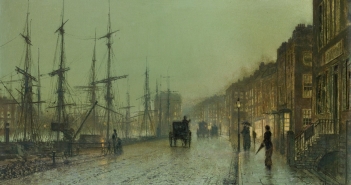In February Anne faced the days with her usual shaky stoicism. She opened the curtains to cold stunted mornings glimmering through the window and at the bottom of the park the pathetic trees. At lunchtime Ryan’s was full of the office crowd so she went at three when she only had a couple of old timers and the occasional dog for company. The barmen knew her and brought a large one to the table when she had settled herself, then she felt OK and had another one. Anne thought about the letter in its pink envelope. She hadn’t opened it immediately but left it on the windowsill pretending not to notice it. When she put her coat on, she picked it up and turned it over to see if there was a return address, nothing. Finally, she slid a butter knife under the gummed flap and tore it open. At first it seemed like the letter was written in a foreign language, she couldn’t understand any of it. She looked again at the name and address on the envelope.
It was getting on for five thirty when Anne left Ryan’s and crossed the road to Dunnes. She wandered through the shelves of fruit and vegetables, the brightly coloured packets of rice and pasta, put a net of oranges in her basket and a sliced pan. Just a sandwich this evening, cheese or a bit of ham maybe biscuits or a fruit cake? Well no. At the checkout a woman was emptying a full trolley, must have a few to feed at home Anne thought. The woman unloaded several packets of mince and a red pepper. This was going to take a while. There were a few people waiting now, the woman was nearly at the bottom only a couple of bottles of Fanta and a bottle of Coke to go. Anne put her items on the conveyor belt. The boy at the checkout looked at her briefly as he put the bottle of Smirnoff through. Tomorrow she’d go to Tesco’s.
The letter was waiting for her when she got home. She smoothed out the page and put on her reading glasses. After she read through it quickly, she sat back. There could be a mistake there must be plenty of Anne Wilsons. How could her mother be alive after all these years with no word It was forty years since that night when Anne was nine years old, the night her mother disappeared. The bottle was within reach, and she poured herself a stiff one. Forty years is a long time still Anne could remember it clearly. It was a Friday night, and her birthday was next day. Ten years old, she would be a big girl and allowed to stay up late. Every detail of that night stood out sharply in her mind, but there was no warning that her mother wouldn’t be there next day. Her father said nothing and said nothing until the day he died. From then on was sad, the brightness was gone. It was worse than if her mother had died then Anne and Dad could have gone to the grave and put flowers on it and cried.
Anne ordered the taxi for six. It was raining and traffic was slow. The taxi driver was listening to the evening news on the radio. Anne sat very still in the back seat waiting for the lights to change as the windscreen wipers swept back and forth making a squeaking noise on the windscreen. The news had given way to ads: insurance, face cream, cold remedies. Anne listened and looked at the lights smudged against the rain spattered glass. The lights turned to green, the taxi inched forward and then sped on unimpeded. It was moving steadily now making its way through gleaming wet streets. She was rarely in this part of town, the buildings seemed darker, the streets emptier. It stopped raining as the taxi drew up to the hospital entrance. She climbed the steep steps and pushed open the gigantic door. Anne’s memories of her mother were all bound up with her disappearance. No child can accept abandonment, there had to be a reason. All through her teens she was haunted by a phantom mother, a mother that didn’t leave. At eighteen she had her first drink. It was in the Palace Bar sitting on high stools with Paul a guy from her class in college. Anne raised her glass of orange and vodka to her mouth and the pain she wasn’t even aware of vanished. A comfortable numbness gathered around her neck and shoulders. In that instant she knew she needed it and that she wanted more.
The hospital was vast and gloomy, there was no sign of her. How would Anne even recognise her? She went to the nurse’s station, but there was no one there. Wandering aimlessly, she eventually noticed some movement from one of the beds, a tiny woman was waving frantically at her.
‘Come here, come here,’ she gasped.
Was this her mother? Maybe she had expected a monster not a little bundle with snowy hair and a soft pink bed jacket.
‘It’s you I knew you as soon as I saw you. Do you hate me? Please don’t hate me I couldn’t bear it’
Anne sat down.
‘What should I call you?’
‘Oh, call me Margaret,’ her face dimpled into a girlish smile.
‘Why are you here? Are you ill?’ Anne asked carefully.
Margaret’s smile faded she plucked distractedly at her bed jacket and blew her nose.
‘Yes’, she said in a small voice. ‘I’ve got cancer’.
Anne caught sight of herself in the window her hair grey and unkempt, her skin greyer still. She didn’t feel able to offer sympathy. It was forty years too late, but still she had the decency to pretend. She was well practised at passing herself off as a decent human being. She turned to her mother.
‘I’m so sorry is there anything you need?’
Her mother’s blue eyes were closing, she tried to say something, but she was overcome with sleep. Anne stood up and bent over the sleeping woman pulling the blankets around her then left the way she had come.
After she graduated Anne and Paul got married and bought a house. They tried to be like everyone else. They had a normal mortgage and a normal car. They got up in the mornings like everyone else and went to work, but that was where it ended. At home with the T.V. turned up loud so the neighbours couldn’t hear they argued heatedly and without inhibition. Alcohol no longer sedated Anne’s anger but seemed to fuel it. There was guilt, shame and above all the need to escape. Still, they went to the pub, on her third double vodka Anne convinced herself this was a good life, the only life she deserved and then the drinks would work their magic once again. One night Paul collapsed and was brought to the cardiac care unit in James’ St Hospital. A year later he didn’t get that far. The house was empty without him. The silent kitchen reminded her of the angry words that had passed between them. She hadn’t told him she loved him for a long time. In work it was harder to hide that things weren’t the way they should be so when she told her boss she was planning early retirement he didn’t discourage her.
She was alarmed to see her mother wasn’t there when she visited again. Then behind her a voice called:
‘Yoo hoo it’s me I’m not dead yet.’
Margaret grinned impishly at her from the confines of a wheelchair.
‘Will you get into the bed for me,’ the nurse cajoled.
When she was settled Margaret turned to Anne and said:
‘Oh, good now we can have a nice chat.’
Anne stiffened.
‘I think you need to tell me where you’ve been all these years.’
‘I met a man who was kind to me,’ Margaret said seriously. And I thought love was the most important thing in the world.’
‘It is,’ Anne surprised herself by saying. ‘But why didn’t you take me with you?’
The older woman started to cry. She dabbed at her eyes with a tissue.
‘You have no idea how many times I asked myself that and then time passed so quickly, and I thought it was too late.’
‘You don’t think it’s too late now?’, Anne asked bitterly.
‘Was it hard for you?’, Margaret ventured.
‘You could say that.’
Anne leaned back in her chair. Then from somewhere deep in her chest she started to laugh. At first Margaret looked shocked and then soon she was chuckling too. Before long the two women were bent over with laughter. It resounded around the ward, down the corridor and out into the star-studded night.
February gave way to March and at the beginning of April when the light is beginning to brighten in the sky Margaret slipped away in her sleep like a child exhausted by play. It was a small gathering at the funeral just one or two nurses from the hospital and some other people Anne didn’t know including a tall man with curly hair wearing a long grey overcoat. She found herself leaving the crematorium with him.
‘Did you know her well’, he asked.
‘No, I really only got to know her recently, but you could say we go back a long way.’
‘I’m her son David,’ he said smiling a familiar youthful smile.
Next morning when Anne opened the curtains pale lemon sunshine washed the famished lawn. Eggshell blue sky, fresh and limitless roofed the world. Spring had arrived in person and to Anne this time it seemed different. There was nothing special about the daffodils clustered under the trees even the birds’ carefree song had been sung a thousand times before, but there was a detail and Anne had noticed first thing. When she opened her eyes this morning she hadn’t wanted to escape.
Feature Image: Irina Iriser




